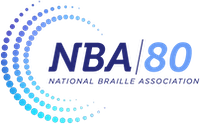Net diagrams
Home › Forums › Tactile Graphics › Net diagrams
- This topic has 3 replies, 2 voices, and was last updated 6 years, 2 months ago by
Braillekey.
-
AuthorPosts
-
February 21, 2019 at 12:10 pm #32918
Susan Baker
ParticipantGood morning!
I am doing a chapter using Nemeth/UEB for a sixth grade math book. Please see the attached page. I am considering omitting the middle step in each of the sequences (the diagram showing the unfolding process of the 3D object), but retaining the 1st 3D diagrams and the 3rd flat net diagrams. I have my doubts that I could produce 2nd step in a manner that would be clear to the reader. Would you think this would be acceptable, and if so, perhaps a TN on the TN page describing this omission? Thank you.
Susan
Attachments:
You must be logged in to view attached files.February 21, 2019 at 9:21 pm #32923Braillekey
ParticipantHi Susan, thank you for writing in to the Ask an Expert Forum. The TG Committee is in agreement with how you are handling this situation. Betty mentioned placing the TN at the first occurrence rather than on the TN page, unless these graphics are repeated throughout the chapter. Also, I've added Donald Winiecki's, a TG Committee member, had this to say about your question: "The first image in each of the sequences she shows in her picture also seems to present a very difficult problem if directly transcribed into a TG. The first of the three she shows might be interpretable by an experienced tactile reader who also has experience with similar physical models. However, the second and third show hidden lines and hidden surfaces that might be a big problem for most tactile readers.
The usual sixth grader is about 11 years old and that is about the time when students are able to begin the formal operations stage, which includes the ability to understand this sort of drawing representation. In fact, my experience is that some sighted students have difficulty with hidden lines and surfaces unless also provided with a physical model!
Perhaps the best solution -- even though it goes past Susan's work as a maths transcriber (she works at the Idaho School for Deaf & Blind -- IESDB -- not too far from my location in Boise) would be to fabricate actual paper models that a student could unfold and then reassemble into those shapes. (Parenthetically, as a kid I absolutely loved this kind of activity and it was something that fed my interest in engineering drawing, illustration, and industrial arts.)"
Susan, if you work directly with the student, Don's suggestion will further clarify the concepts to be learned. However, if this is strictly a textbook transcription, the manner in which you handled it is suffice.
Hope this helps!
-
This reply was modified 6 years, 4 months ago by
Braillekey.
February 22, 2019 at 11:28 am #32930Susan Baker
ParticipantGood morning, and thank you so much for everyone's input. It is really appreciated, and I feel it helps me to grow as a transcriber. Although I don't have actual contact with this student, I do collaborate with her TVI, and I will share the advice you have given me about the actual models. In fact, I will do one better! After reading the advice Don suggested, I scrounged around in my teaching bins and I found about 8 different of these cardboard models from years ago, and I will send them along to the teacher to use with the student. I attached a picture of two of these models. Though I might not every model that corresponds with each shape in the book, it should be enough that the teacher might see how these are done and create any missing ones. I will still plan to make a tactile graphic in my transcription for the 1st and 3rd steps (omitting the 2nd, and placing a TN before the first occurrence in the transcription).
A follow-up question: would it be recommended for me to put a note on the TN page, something to the effect of, due to the difficulty presented with hidden lines within the 3D diagrams, hands-on experience with actual models are suggested? I didn't know if that was outside the realm of what a transcriber could or should do, but would appreciate your feedback.
Thanks!
Susan
Attachments:
You must be logged in to view attached files.April 19, 2019 at 11:16 am #33400Braillekey
ParticipantHi Susan, I am so sorry for missing this follow-up question. I didn't receive a second notification regarding this thread.
The TN listed in your follow-up question is great. As a matter of fact, all the transcriber's notes you have shared with this forum fall within the responsibility of a braille transcriber. This is due to the fact that the material was not transcribed exactly as it is shown in print and the suggested use of 3D models provide a clear understanding of the material. Both of these reasons merit the use of TNs.
Thank you for sharing your pic with us. Those models really reinforce the learning of hidden lines within these net patterns.
Great work Susan!
-
This reply was modified 6 years, 2 months ago by
Braillekey.
-
This reply was modified 6 years, 4 months ago by
-
AuthorPosts
Everyone is free to read the forums, but only current NBA members can post. Become a member today. Click here to Login and return.
